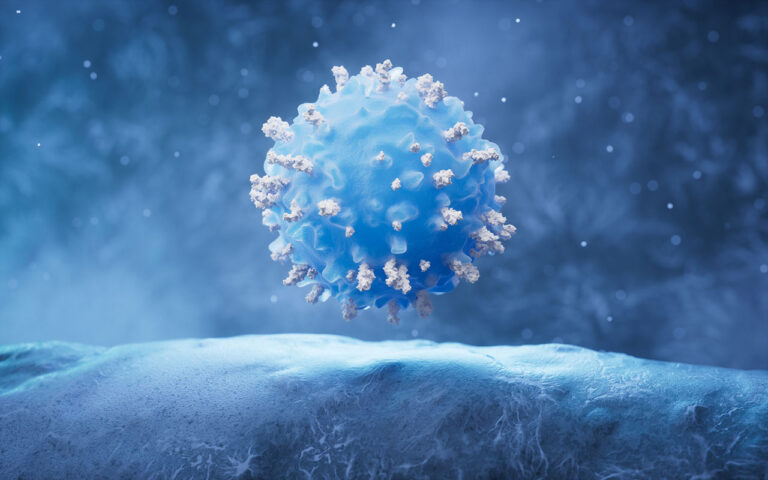
Thuốc ức chế điểm kiểm soát miễn dịch (ICI) là những tác nhân thuốc mạnh mẽ kích thích phản ứng miễn dịch lâu dài chống lại ung thư. Liệu pháp miễn dịch ICI đã cách mạng hóa các quy trình điều trị ung thư và hiện đã trở thành một lựa chọn hiệu quả cho bệnh nhân ung thư tiến triển hoặc khó điều trị (ung thư ác tính).
Tham khảo ý kiến của chuyên gia IVIG
Tuy nhiên, các tác nhân chống ung thư này đôi khi có thể kích thích quá mức phản ứng miễn dịch và gây ra một số tác dụng phụ, còn được gọi là các tác dụng phụ liên quan đến miễn dịch (irAE) hoặc độc tính liên quan đến chất ức chế điểm kiểm soát miễn dịch. Độc tính liên quan đến ICI có thể ảnh hưởng đến tất cả các cơ quan, nhưng da, cơ quan tiêu hóa và nội tiết thường bị ảnh hưởng nhiều hơn.
Nếu bạn hoặc người quen của bạn đang gặp phải tình trạng độc tính liên quan đến điểm kiểm soát miễn dịch ở mức độ nghiêm trọng đến trung bình, thì Liệu pháp IVIG có thể được xem xét để kiểm soát các độc tính này (hay còn gọi là irAE). Bài viết này giải thích ngắn gọn về thuốc ức chế điểm kiểm soát miễn dịch, các độc tính mà chúng gây ra và cách IVIG có thể giúp kiểm soát chúng.
Thuốc ức chế điểm kiểm soát miễn dịch là gì?
Thông thường, hệ thống miễn dịch của bạn có các điểm kiểm soát miễn dịch, là những protein hoạt động như một chiếc phanh để ngăn chặn các tế bào miễn dịch tấn công các tế bào khỏe mạnh bình thường. Tuy nhiên, một số tế bào ung thư có thể tránh bị tiêu diệt bằng cách sản xuất protein điểm kiểm soát của riêng chúng.
Khi các protein điểm kiểm tra của tế bào ung thư liên kết với các protein điểm kiểm tra của tế bào T, chúng sẽ vô hiệu hóa các tế bào T - kết quả là, các tế bào ung thư tiếp tục phát triển và lây lan.
Thuốc ức chế điểm kiểm soát miễn dịch (ICI) ngăn chặn các protein này trên tế bào T và tế bào ung thư. Điều này kích hoạt tế bào T và cho phép chúng tiêu diệt tế bào ung thư một cách hiệu quả.
Độc tính liên quan đến thuốc ức chế điểm kiểm soát miễn dịch là gì?
Mặc dù ICI đã điều trị thành công một số loại ung thư như u tủy, thận hoặc phổi, nhưng đôi khi chúng có thể kích thích quá mức hệ miễn dịch, dẫn đến độc tính liên quan đến chất ức chế điểm kiểm soát miễn dịch hoặc các tác dụng phụ liên quan đến miễn dịch. Độc tính xảy ra sớm và thường xảy ra từ vài tuần đến 3 tháng sau khi bắt đầu dùng thuốc ức chế điểm kiểm soát miễn dịch.
Loại ICI bạn đã nhận được có thể ảnh hưởng và gây viêm ở bất kỳ cơ quan nào trong cơ thể. Một số cơ quan bị ảnh hưởng có thể gây ra tác dụng phụ (độc tính) bao gồm:
- Da (Viêm da, thấy ở các trường hợp từ 40% đến 60%)
- Phổi (Viêm phổi, được thấy trong 5% trường hợp)
- Hệ thống nội tiết (Suy giáp, gặp ở 6% trường hợp)
- Hệ tiêu hóa (Viêm đại tràng nặng, gặp ở 2% đến 7% trường hợp)
- Gan (Viêm gan, gặp ở 5% đến 10% ca bệnh)
- Biến chứng thần kinh (Viêm não màng não, bệnh nhược cơvà bệnh lý thần kinh ngoại biên, được thấy ở 1% đến 5% của các trường hợp)
Mỗi bệnh nhân đáp ứng với liệu pháp miễn dịch ICI khác nhau. Độc tính của ICI có thể khác nhau ở mỗi bệnh nhân ung thư và có thể từ nhẹ đến nghiêm trọng, gây tử vong. Do đó, cần có một phương pháp điều trị tiêu chuẩn để kiểm soát độc tính liên quan đến chất ức chế điểm kiểm soát miễn dịch mà không làm mất hoàn toàn tác dụng chống ung thư của nó.
Độc tính liên quan đến thuốc ức chế điểm kiểm soát miễn dịch được quản lý như thế nào?
Các nhà cung cấp dịch vụ chăm sóc sức khỏe điều trị độc tính liên quan đến chất ức chế điểm kiểm soát miễn dịch tùy thuộc vào mức độ nghiêm trọng. Ví dụ, các trường hợp nhẹ thường được điều trị bằng chăm sóc hỗ trợ và theo dõi cẩn thận. Trong hầu hết các trường hợp, corticosteroid (ví dụ, prednisone) được dùng để điều trị các trường hợp từ trung bình đến nặng.
Trong một số trường hợp, khi bệnh nhân không đáp ứng với steroid, thì thuốc ức chế miễn dịch như mycophenolate mofetil hoặc infliximab sẽ được sử dụng trong phác đồ điều trị cho những bệnh nhân này.
Nói chuyện với một chuyên gia
Về Trợ cấp đồng thanh toánIVIG có thể kiểm soát độc tính liên quan đến thuốc ức chế điểm kiểm soát miễn dịch như thế nào?
Liệu pháp IVIG có thể được sử dụng như một phương pháp điều trị bổ sung trong một số trường hợp nghiêm trọng của ngộ độc liên quan đến chất ức chế điểm kiểm soát miễn dịch. Ví dụ, một báo cáo trường hợp đã chứng minh rằng liệu pháp steroid liều cao và điều trị IVIG đã giải quyết được độc tính liên quan đến chất ức chế điểm kiểm soát miễn dịch ở một bệnh nhân ung thư phổi không phải tế bào nhỏ bị viêm thực quản, viêm dạ dày và viêm cơ tim sau khi dùng ICI (ví dụ: pembrolizumab).
IVIG điều chỉnh hệ thống miễn dịch bị kích thích quá mức theo nhiều cách:
Nó trung hòa các kháng thể tự miễn
Liệu pháp IVIG trung hòa các tự kháng thể do ICI sản sinh ra do hệ miễn dịch bị kích thích quá mức. Nó chống lại tác dụng của các tự kháng thể này.
Nó làm giảm viêm
Vì IVIG có tác dụng chống viêm nên nó cũng giúp giảm viêm do phản ứng miễn dịch quá mức gây ra bởi ICI.
Nó ngăn ngừa tổn thương mô
IVIG ngăn ngừa tổn thương mô bằng cách ngăn chặn các đợt tấn công miễn dịch bổ sung.
Tóm lại, IVIG giúp bệnh nhân kiểm soát độc tính có hại của thuốc ức chế điểm kiểm soát miễn dịch (ICI) đồng thời ổn định hệ thống miễn dịch. Điều này cho phép bệnh nhân hưởng lợi từ việc điều trị ung thư bằng ICI mà không ảnh hưởng đến đáp ứng miễn dịch.
Khi nào IVIG được sử dụng để điều trị độc tính liên quan đến thuốc ức chế điểm kiểm soát miễn dịch?

IVIG không phải là phương pháp điều trị đầu tay cho tình trạng độc tính liên quan đến chất ức chế điểm kiểm soát miễn dịch và chỉ được khuyến cáo trong một số trường hợp nhất định:
- Khi thuốc corticosteroid hoặc các loại thuốc ức chế miễn dịch khác không thể kiểm soát độc tính liên quan đến chất ức chế điểm kiểm soát miễn dịch
- Khi một số bệnh nhân không thể dung nạp liều cao steroid do các bệnh khác
- Là phương pháp điều trị ngay lập tức, trong một số trường hợp hiếm gặp nhưng nghiêm trọng, khi corticosteroid không đủ để kiểm soát ICI liên quan đến hội chứng Steven-Johnson (SJS) và hoại tử biểu bì nhiễm độc (TEN)
Tại sao IVIG được xem xét để điều trị độc tính liên quan đến thuốc ức chế điểm kiểm soát miễn dịch?
IVIG được xem xét sử dụng để điều trị độc tính liên quan đến chất ức chế điểm kiểm soát miễn dịch vì hai lý do chính:
- Đầu tiên, IVIG có phản ứng nhanh, nghĩa là nó có tác dụng nhanh và có thể kiểm soát các độc tính nghiêm trọng hoặc khó điều trị liên quan đến ICI.
- Thứ hai, IVIG nhắm vào các bộ phận cụ thể của hệ thống miễn dịch và không ảnh hưởng đến hiệu quả của ICI, không giống như các loại thuốc ức chế miễn dịch khác.
Nhận được sự cho phép trước của IVIG
Liều lượng chuẩn của IVIG cho độc tính liên quan đến thuốc ức chế điểm kiểm soát miễn dịch là gì?
Liều lượng IVIG có thể khác nhau tùy theo bệnh nhân và loại độc tính mà họ đang gặp phải. Ví dụ, immunoglobulin tiêm tĩnh mạch có thể được dùng với liều 2 g/kg (0,4 g/kg/ngày trong 5 ngày) để điều trị tình trạng hoại tử biểu bì nhiễm độc do ICI gây ra (một loại bệnh về da), viêm phổi (một loại bệnh về phổi), bệnh nhược cơ, Và GBS.
Những bệnh nhân được điều trị bằng IVIG cho thấy tình trạng bệnh được cải thiện đáng kể. Tuy nhiên, IVIG có thể gây ra một số tác dụng phụ. tác dụng phụ, chẳng hạn như đau đầu, sốt, buồn nôn và phản ứng dị ứng.
Phần kết luận
Mặc dù thuốc ức chế điểm kiểm soát miễn dịch (ICI) được coi là hiệu quả trong điều trị ung thư ác tính, nhưng chúng cũng gây độc tính (tác dụng phụ) ở một số bệnh nhân bằng cách kích thích quá mức hệ thống miễn dịch.
Nếu bạn hoặc người thân đang gặp bất kỳ triệu chứng bất thường hoặc độc tính liên quan đến ICI, liệu pháp IVIG có thể giúp kiểm soát các độc tính này. IVIG thực hiện điều này bằng cách điều chỉnh hệ thống miễn dịch hoạt động quá mức mà không làm gián đoạn cơ chế hoạt động của ICI trong việc chống lại ung thư.
Bạn nên tham khảo ý kiến của nhà cung cấp dịch vụ chăm sóc sức khỏe để có được phác đồ IVIG phù hợp với tình trạng độc tính liên quan đến ICI của bạn.
TÀI LIỆU THAM KHẢO:
- Durrechou, Q., Domblides, C., Sionneau, B., Lefort, F., Quivy, A., Ravaud, A., Gross-Goupil, M., & Daste, A. (2020). Quản lý độc tính của thuốc ức chế điểm kiểm soát miễn dịch. Quản lý và nghiên cứu ung thư, 12, 9139. https://doi.org/10.2147/CMAR.S218756
- Conroy, M., & Naidoo, J. (2022). Các tác dụng phụ liên quan đến miễn dịch và tác dụng cân bằng của liệu pháp miễn dịch. Truyền thông thiên nhiên, 13(1), 1-4. https://doi.org/10.1038/s41467-022-27960-2
- Kian, W., Zemel, M., Elobra, F., Sharb, AA, Levitas, D., Assabag, Y., Alguayn, F., Yakobson, A., Rouvinov, K., & Fuchs, L. (2021). Hiệu quả của globulin miễn dịch tiêm tĩnh mạch đối với pembrolizumab gây ra hoại tử biểu bì nhiễm độc nghiêm trọng. Thuốc chống ung thư, 33(1), e738. https://doi.org/10.1097/CAD.0000000000001162
- Haanen, J., Carbonnel, F., Robert, C., Kerr, K., Peters, S., Larkin, J., & Jordan, K. (2017). Quản lý độc tính từ liệu pháp miễn dịch: Hướng dẫn Thực hành Lâm sàng ESMO về chẩn đoán, điều trị và theo dõi. Biên niên sử về Ung thư học, 28, iv119-iv142. https://doi.org/10.1093/annonc/mdx225
- Sullivan, RJ, & Weber, JS (2022). Độc tính liên quan đến miễn dịch của thuốc ức chế điểm kiểm soát: Cơ chế và chiến lược giảm thiểu. Đánh giá về thuốc Nature, 21(7), 495-508. https://doi.org/10.1038/s41573-021-00259-5
- Thompson, JA, Schneider, BJ, Brahmer, J., Achufusi, A., Armand, P., Berkenstock, MK, Bhatia, S., Budde, LE, Chokshi, S., Davies, M., Elshoury, A., Gesthalter, Y., Hegde, A., Jain, M., Kaffenberger, BH, Lechner, MG, Li, T., Marr, A., McGettigan, S., . . . Hang, L. (2022). Quản lý các độc tính liên quan đến liệu pháp miễn dịch, Phiên bản 1.2022, Hướng dẫn thực hành lâm sàng của NCCN về ung thư. Tạp chí của Mạng lưới Ung thư Toàn diện Quốc gia, 20(4), 387–405. https://doi.org/10.6004/jnccn.2022.0020
- Haugh, AM, Probasco, JC, & Johnson, DB (2020). Biến chứng thần kinh của thuốc ức chế điểm kiểm soát miễn dịch. Ý kiến chuyên gia về an toàn thuốc, 19(4), 479–488. https://doi.org/10.1080/14740338.2020.1738382
- Marin-Acevedo, JA, Chirila, RM, & Dronca, RS (2019). Độc tính của thuốc ức chế điểm kiểm soát miễn dịch. Biên bản của Phòng khám Mayo, 94(7), 1321–1329. https://doi.org/10.1016/j.mayocp.2019.03.01













